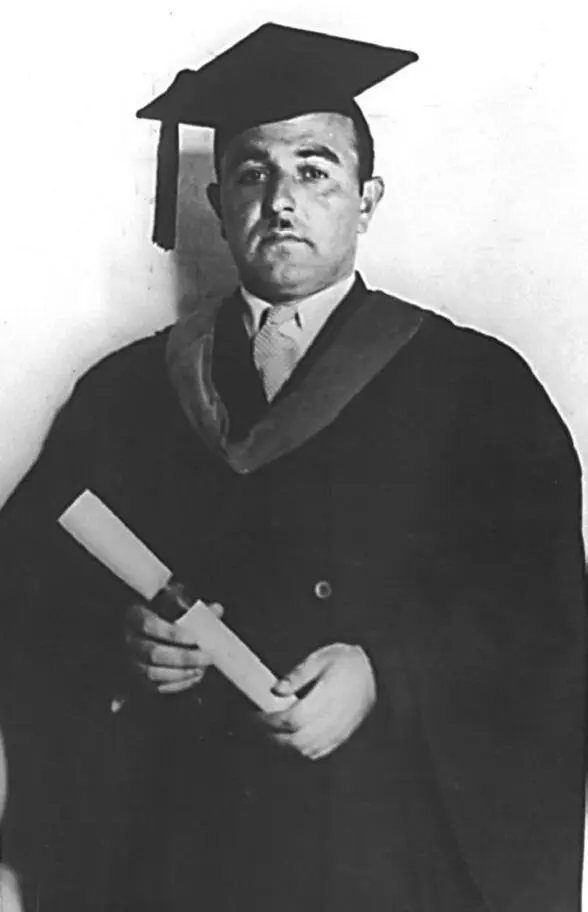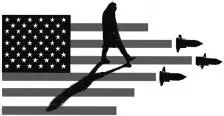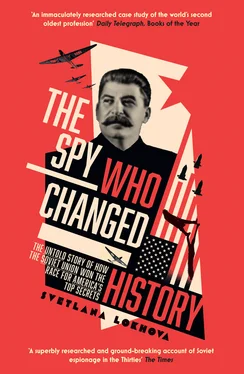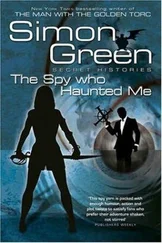Primakov had enjoyed a glittering career in the Red Army and the intelligence service. He cut his teeth leading a squadron of troops in the attack on the Petrograd Winter Palace in 1917. The highlight of his espionage career came in 1929 when, disguised as a Turkish officer named Ragib-bey, he led a special operation of Soviet troops to try to reinstate Amanullah Khan as ruler of Afghanistan. He was arrested in 1936 and executed in the following year’s Great Purge. 30
Although in letters to her family Klivans complained that living conditions in Moscow had left her with ‘a few bedbug bites’, she declared herself ‘very happy with my work’. She worked diligently to teach her charges all about America:
You can’t imagine how well I know these boys, all of whom are at least five years older [than me] … They will do anything for me and believe me I do plenty for them, besides keeping them in cigarettes and informing them of certain Americanisms. I mean as far as deportment is concerned, I try to make each of them letter perfect in the President’s English and if you think it isn’t hard work you are mistaken. But there are always three at least who are making love to me outside of school hours so that I can never keep a straight face for at least five minutes going in class. If you would see them, all in their fur hats, high felt boots, and a week’s beard for nobody shaves more than once in five days you would laugh. But they are fun, and I certainly will always have 15 fast friends in Russia. Probably someday one of them will be another Stalin – they are all party men, active and so understanding of my distorted view of life as they can understand the limitations of my bourgeois environment, the only thing they can’t understand is why I haven’t already embraced Communism without any reservations. 31
To celebrate the end of the examinations after her language course, Klivans threw a party for the students on 15 April 1931, for which she prepared the closest approximation she could manage to American sandwiches and salads. The only woman at the party, she wore a ‘Chinese suit’ acquired on her travels. It was an emotional occasion with many hours of dancing and singing. Klivans travelled to the United States ahead of her Russian students, describing them in her letter home:
Let me tell you who the boys are. They are all 27 or 28. One [Alexander Gramp] is half Georgian and half Armenian – speaks both of these languages and knows every place on the map of Russia with his eyes shut – has a disposition that even Russian conditions cannot spoil. Another is a White Russian [MIT-bound Eugene Bukley] – as clever as any three people I’ve met and had a sense of humor that works equally well in any language – the third [Peter Ivanov, a future student at Harvard] is a serious electrical engineer who served as a sort of lever in our hilarious spirits. Of the first two, one is a railway engineer, in fact, that got us tickets everywhere – something almost unheard of in Russia today. The other one is also an electrical engineer. 32

Alexander Gramp’s graduation, Purdue University,1933
Klivans’s closest relationship was with the railway engineer, Gramp, one of the five students with a place at Purdue University. He married her after his graduation, returning with her to Moscow following his appointment as Dean of the College of Railway Engineering.
Eager to ensure that her students made a good impression on their arrival at MIT and other US universities, Klivans pressed successfully for scarce foreign currency reserves. When they landed in New York, she wanted to buy them smart, well-cut suits.

3
‘WHAT THE COUNTRY NEEDS IS A REAL BIG LAUGH’
To the disappointment and astonishment of Communists, the American working people did not rise up en masse during the Great Depression to demand even the overhaul – much less the overthrow – of their system of democratic capitalism, despite the failure to relieve their sufferings for more than a decade. Arriving at the height of the economic misery, a confident Gertrude Klivans held court in her stateroom on SS Bremen at the New York docks. She was back at long last in the United States, a returning political pilgrim and a secret convert to Communism. While she was already an agent of INO, Klivans did not consider herself a traitor to the US, but rather a contributor to helping the peoples of the Soviet Union.
Her courtiers were a small crowd of journalists, fans of the small-town socialite-turned-adventurer. She was a Youngstown, Ohio celebrity. Local magazines had serialised parts of the letters she had written to her family from the mysterious, godless USSR describing most of her adventures. Exposure to the socialist experiment had transformed her in just a year from a frustrated English Literature teacher at the local high school into a confident woman, delighted to be sought out for her views on the world. She was secretly engaged, if not already married, to her fellow agent Alexander Gramp. She adroitly ducked answering questions from the wire services on international politics, but was more than happy to announce that the first Soviet Five-Year Plan was a resounding success. Joseph Stalin must have been pleased. The journalists asked her if it was possible to teach the Soviet leaders anything. She replied, ‘Indeed yes, in fact, they are the most teachable people to be found.’ 1
Amid America’s worst ever socio-economic crisis, Klivans delivered the message that a socialist future was the answer to her society’s ills. Before October 1929 the United States had believed that it would enjoy an uninterrupted period of increasing prosperity. This mirage was not an invention of the people but was what they had been told by their leaders. In his last State of the Union address in 1928, President Calvin Coolidge had said: ‘No Congress of the United States ever assembled, on surveying the state of the Union, has met with a more pleasing prospect than that which appears at the present time.’ 2 He had overseen an expanding economy based on easy access to consumer loans for housing, its citizens buying vast numbers of new automobiles on credit instalment plans. The vehicles, once a luxury, were now commonplace and seemingly affordable; there was even a fear that the car would create an amoral society as young couples were now out of sight of their parents. That great barometer of America’s health, the stock market indices, were not merely soaring on the back of the credit bubble; they went through the roof. The Dow Jones Industrial Average quadrupled between 1924 and 1929. America appeared to be on the brink of economic greatness.
Led by New York, the modern cities of the USA were a bustling hive of theatre, movies, arts, food and sober fun. Based on its global leadership in technological innovation, mass production and consumerism, America had overtaken the British Empire as the pre-eminent economic power in the world. When Herbert Hoover campaigned for the presidency in 1928, he assured the country it could expect ever greater economic prosperity. In a campaign speech, he said: ‘We in America today are nearer to the final triumph over poverty than ever before in the history of any land. We shall soon, with the help of God, be in sight of the day when poverty will be banished from this nation.’ 3
Hoover would later quip that he was the first man in history to have a depression named after him. For all these dreams came crashing down in just a few days in 1929, and for the next decade, even the Big Apple became a sombre city of hopeless, desperate people. The stock market crash began on 24 October and ended on the 29th. In a matter of four days, America saw $30 billion of its wealth wiped out for ever. Within months New Yorkers were starving to death. Large crowds of bewildered investors, bank workers and concerned citizens wandered around Wall Street in a daze during the crash. In an attempt to exercise some control the police began making arrests. After the initial panic, worse was to follow.
Читать дальше














